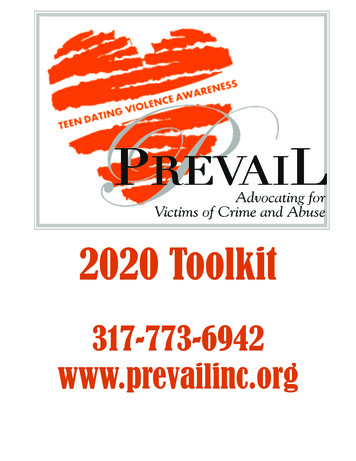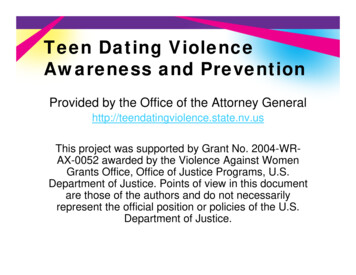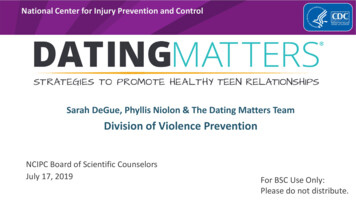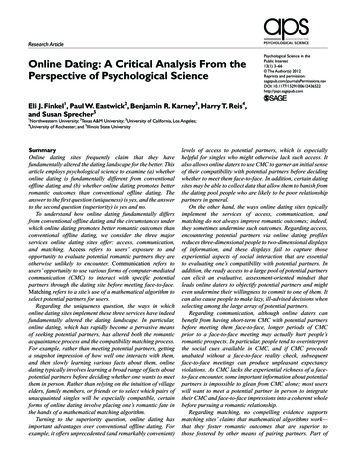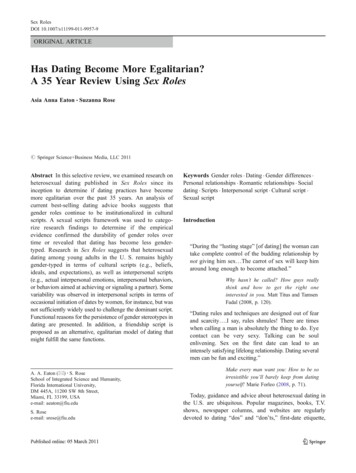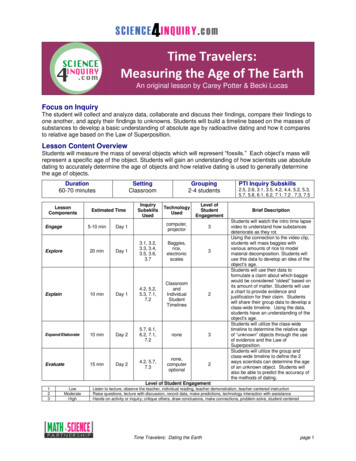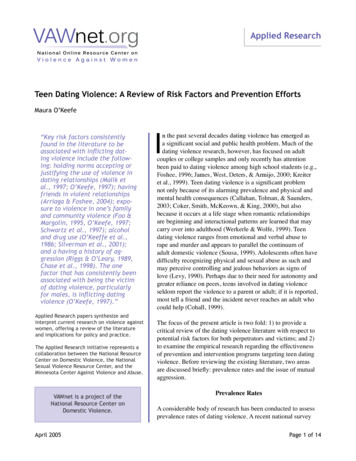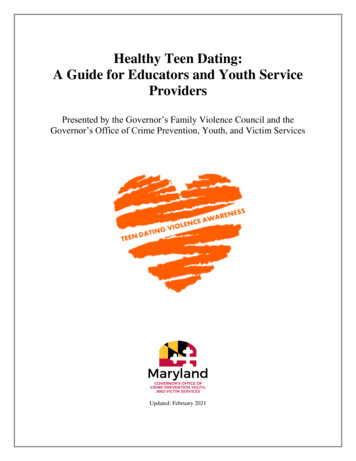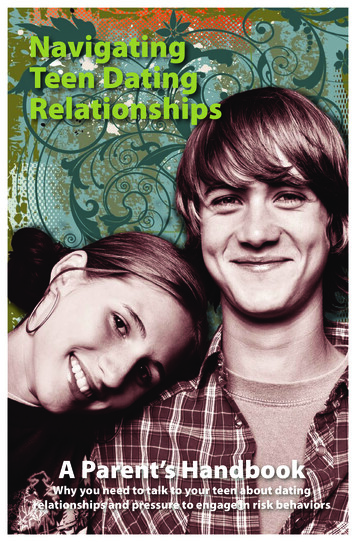
Transcription
NavigatingTeen DatingRelationshipsA Parent’s HandbookWhy you need to talk to your teen about datingrelationships and pressure to engage in risk behaviors
Healthy RelationshipsAs your son or daughter transitionsfrom middle or junior high schoolto high school, friendships and peergroups often take priority over familyrelationships. It is a natural phaseof separation from parents andexperimentation with peers. Andnew findings show that the partsof the brain that are responsiblefor functions such as self-control,and/or violence. Teens who learn todevelop healthy relationships are morelikely to have healthy relationshipsthroughout their lives.As parents, we want to know howto help our teens form healthyrelationships. Teens learn how toact in relationships from parents,siblings, friends, and the media. Youshould provide reliable and accurateinformation to your teen about whata healthy relationship feels like, lookslike, and sounds like.You can help your teen recognize thecharacteristics of healthy relationshipsby talking with your son or daughterabout healthy relationships andlistening to his or her opinions abouthealthy or unhealthy relationships.One of the most effective ways ofteaching your son or daughter abouthealthy relationships is to modelpositive relationships.judgment, and emotions are stilldeveloping during the teen years.This may help to explain certainteenage relationship behaviors,such as poor decision-making andemotional outbursts.Healthy teen relationships canpositively influence your son ordaughter’s ability to make safe andgood decisions when pressured toengage in adolescent risk behaviors- sexual activity, alcohol or drug use,Even when you think your teens arenot listening to you or watching you,they often are. Parents play a criticalrole in providing a good example andteaching teens the importance ofhealthy relationships.As parents, we need to help our teensrecognize and discuss the full rangeof emotions that connect people toone another. Without emotions andan awareness and understandingof them, it is difficult to build ormaintain strong, healthy relationships.Encourage your teen’s emotionalawareness - the ability to recognizemoment-to-moment emotionalexperience and to express all of his orher feelings effectively.
Healthy teen relationships are the most effectiveprotection against adolescent risk behaviors.Characteristics of Healthy RelationshipsEngage your teen in discussions about dating relationships using the followingguidelines for characteristics that a healthy relationship should include:Respect – Are you accepted by your girlfriend or boyfriend for who you are? Noone should pressure you into doing things you are not comfortable with, such asdrinking, drugs, or unwanted physical contact.Safety – Do you feel safe emotionally and physically in all your relationships?Emotional safety means you feel comfortable being you without fear of being putdown. Physical safety means you are not being hurt or pressured into unwantedphysical contact.Support – Does your boyfriend or girlfriend care for you and want what is best foryou? Your boyfriend or girlfriend should understand if you are unable to hang outbecause you need to study or if a parent asked you to spend time with family.Individuality – Do you pretend to like something you don’t or be someone youaren’t just to fit in or be liked by certain people? Be yourself; after all, being anindividual is what makes you you!Fairness and Equality – Do you have an equal say in your relationships? From theactivities you do together to the friends you hang out with, you should have anequal say in the choices made in all your relationships.Acceptance – Does your girlfriend or boyfriend accept you for who you really are?You shouldn’t have to change who you are or compromise your beliefs to makesomeone like you.Honesty and Trust – Are you always honest and is your boyfriend or girlfriendhonest with you? Honesty builds trust. You can’t have a healthy relationshipwithout trust. If you have ever caught someone in a lie, you know that it takes timeto rebuild your trust.Communication – You should listen to one another and hear one another out.Do you talk face-to-face (not just text) about your feelings? One of the mostimportant characteristics in any healthy relationship is effective communication.Assertive communication and emotional awareness can help you deal withconflict. Good communication builds the foundation for healthy relationships.
Understand RiskBehaviors andPressures on TeensAs your teen negotiates high school,he or she will struggle with thepressure to fit in and will likely beexposed or pressured to experimentwith risk behaviors, such as sexualactivity, alcohol or drug use, orviolence. The connection betweenadolescent risk behaviors and peeror dating relationships is oftenoverlooked. Unhealthy or abusive peeror dating relationships almost alwaysadd to the pressure to participatein risk behaviors. It will often be theteen’s skills in negotiating, decisionmaking, and problem-solving in thecontext of relationships that willdetermine his or her degree of risk.Healthy relationships can protectteens from the pressures to engagein risk behaviors. As parents, weneed to teach our teens the skillsneeded to identify and develophealthy relationships before they areexposed to pressures to engage inrisk behaviors.Pressure to conform to what otherteens decide is acceptable is oneof the strongest pressures faced byteens. Teens want to be accepted forwho they are, but it can be difficult,if not impossible, if they are worriedabout being humiliated, bullied,threatened, or even hurt. Thesepressures are particularly real forteens who seek more individuality,have unusual interests, come fromdifferent cultures, have a differentsexual orientation, or who arenoticeably different in any way.For many teens, the pressure tochange their beliefs, values, orboundaries in order to keep aboyfriend or girlfriend is tremendous.Teens face much more pressure todayto be “racy” and sexually active thanever before. Both genders reportfeeling these pressures.Teens need to know the differencebetween dating and sex. Datingis not an avenue to sex; it is anopportunity to get to know someonebetter. Sex should be discussedopenly before dating starts (evengroup dating), and teens shouldrecognize that abstinence is alwaysan option. It is important that youshare your values and concernsbefore your teen starts dating.
Strategies to encourage healthy relationships Be sensitive to the pressures of adolescence and provide understanding,support, and guidance – but know the limits you must set for your teen’s safety. Create positive connections and interactions with your teen. Spend timelistening and talking with your teen every day. Maintain family traditions andinvolve other trusted adults in his or her life. Be aware of your teen’s use of technology and set age-appropriate limits. Askhis or her opinion about unhealthy relationship messages in popular music(lyrics offer great teachable moments), books, video games, television, andmovies. When appropriate, express your concern or opinion about theaccuracy of the popular media, sexism, racism, or violence. Be involved. Encourage and support your teen’s individual interests andinvolvement in his or her school or community. Be an assertive parent – not too strict or too loose – with a balance of sensitivityand firmness. Be firm about expectations and the consequences of actions. Encourage and model healthy and safe relationships. Discuss what a healthyrelationship looks like, feels like, and sounds like. Express clear values and expectations. Talk about your views, especially yourviews on sexual activity, drugs and alcohol, abusive relationships, and other riskbehaviors such as self-harming (e.g., cutting) and eating disorders. Prepare your teen to handle the pressures of adolescence. Role playing will helpyour teen prepare for the exposure to risk behaviors. Encourage your teen’s emotional awareness - the ability to recognize momentto-moment emotional feelings and to express all feelings (good and bad)appropriately. Encourage and model equality in gender roles and behavior.
New Pressures on Teens& Risks of TechnologyWarning signs of useof technology andunhealthy relationships Relationships with friends or peers thatrequire constant contact Skipping activities, meals, andhomework or a drop in grades Sleeping with a cell phone under his orher pillow or on his or her chest Having irrational reactions to beingwithout a phone or Internet access orhaving to answer the phone right away Substantial increases in the amount oftime spent talking, texting, or on socialnetworking sites Taking unnecessary risks such as usinga cell phone at inappropriate times(during class, etc.)More than any previous generation,today’s teens are connected toone another, and to the world, viadigital technology. Recent datasuggests that social networking siteslike Facebook and MySpace havesurpassed email as the preferredmethod of communication in allage groups. While today’s teens maybe more digitally savvy than earliergenerations, their lack of maturityand life experience can quickly getthem into trouble with these newsocial venues.Teen relationships are impacted by cellphones and social networking sites.It is important that you talk with yourteen about social media and monitor ayoung teen’s use of social networkingsites to help them navigate this newonline social world.As a parent, you should learn aboutthese electronic technologies firsthand – there is simply no better way tolearn than to have a profile yourself.Parents need to consider creatingage appropriate limits on the use ofthese technologies. Make sure youare clear with your teen about whatyou consider appropriate “electronic”behavior. Just as certain language isunacceptable in your house, make sureyou let your teen know what is and isnot allowed online. Give reminders ofthose expectations from time to time.It doesn’t mean you don’t trust yourson or daughter, it just reinforces that
you care about him or her enough tobe paying attention.For all teens, emphasize thateverything sent over the Internet orby cell phone can be shared with theentire world. So, it is important yourteen uses good judgment in sendingmessages and pictures and that he orshe set appropriate privacy settingson social media sites. Parents needto discuss what “good judgment”means and the consequences ofpoor judgment – ranging fromminor punishment to possiblelegal action in the case of sextingor bullying. Remember to make apoint of discouraging your teen fromgossiping, spreading rumors, bullying,or damaging someone’s reputation viatexting or other technologies.Be transparent about any type ofmonitoring and let your youngteen know what you are doing.Transparency is critical to continueto build trust between you and youryoung teen. Some families maycheck once a week and others moresporadically. Other parents mightconsider formal monitoring systemsTo keep your teen safe, have your teenshow you where the privacy featuresare for the social networking sites heor she is using. The more private thesettings, the less likely inappropriatematerial will be received by your teenor sent to his or her circle of friends.Young Teens and TechnologyAs a parent, you will need to strikea balance between safety concernsand the normal developmental needof young teens to separate fromtheir parents. As a safety precaution,parents should consider somelevel of monitoring of your youngteen’s use of these technologies.Periodically check chat logs, emails,files, and social networking profilesfor inappropriate content, friends,messages, and images.to track your young teen’s email,chat, instant messaging, and imagecontent. Whatever level of monitoringyou choose as a parent, talk with yourteen and let them know why you areconcerned about their safety. As yourteen matures, you should allow themmore privacy and autonomy.
The Problemof “Sexting”“Sexting” refers to sending a textmessage with a photograph of a personwho is naked, engaged in a sexualact, or is otherwise inappropriate.According to a recent survey, about 20percent of teen boys and girls have sentsuch messages. The emotional pain itcauses can be enormous for the teenin the picture as well as the sender andreceiver – often with legal implications.Begin the conversation about sextingbefore your teen has a problem – eitherreceiving an inappropriate text or beingpressured to send one: Start the conversation withquestions like, “Have you heardof sexting?” Be very specific that “sexting” ofteninvolves pictures of a sexual nature, isconsidered pornography, and maybe illegal.
Make sure your teen understandsthat sexting is serious andconsidered a crime in manyjurisdictions. In allcommunities, if he orTalk to your teen about cell phonesshe “sexts,” there will beSafety – Do not give your phone number to anyone youserious consequences,do not know. Do not answer any calls or reply to anyquite possibly involvingtexts unless you know the caller.the police, suspensionfrom school, and notesPhone usage – Do not send abusive or humiliatingon his or her permanentrecord that could hurt his texts or pictures or make pranks. If you are harassed onor her chances of getting the phone, show an adult you trust. Know and followyour school policy on cell phones. Turn the phone offinto college, the armedwhile you are doing your homework and at bedtime.forces, or getting a job.At night, consider leaving the phone in the kitchen forcharging until the next morning. Monitor headlines inthe news for storiesInappropriate usage – Do not use your phone to sendabout “sexting” thatthreatening phone or text messages or to intimidateillustrate the very realothers. Bullying or being mean with a cell phone, whileconsequences for bothless personal, is no less wrong. Do not use your phonesenders and receiversto cheat in school. Texting answers to tests or using aof these images. Startphone to search the web during a test is cheating.a conversation aboutthese headlines withCameras – Sending or forwarding sexually explicitquestions like: “Have you photographs is against the law. If you receive anyseen this story?”, “Whatpictures from friends that make you uncomfortable,did you think abouttell a parent or an adult you trust about it. Also, secretlythis?” Or “What wouldtaking photos or taking video clips of someone invadesyou do if you were thisthat person’s privacy and is wrong.teen?” Rehearse waysyour teen can respondAccountability – Be responsible for helping outif asked to participate inwith the bill (paying for the texting, pay for half,inappropriate texting.chores in exchange for the phone bill, etc.). Reviewthe bill together.Parents are encouragedto support school andConsequences – If any of the above rules are broken,community efforts tothe phone will be taken away for a period of time to beeducate parents, teachers,determined by the severity of the violation.and students on issuesinvolving sexting.[New Pressures on Teens and Risks of Technologyand The New Problem of “Sexting” was adaptedfrom the American Academy of Pediatrics website.]
Effective Ways to Talkwith Your Teen AboutDating RelationshipsIt’s never too late to help your teendevelop healthy relationship skills andto be concerned about risk-takingassociated with dating relationships.Talking with your teens about datingrelationships shouldn’t be a singleconversation, but an open andongoing dialogue. Keep the lines ofcommunication going and look foropportunities to engage your teen inconversations about healthy datingrelationships. The surest way to keepthe dialogue going is to show thatyou respect and welcome your teen’sopinions, thoughts, and ideas.There is a good probability that yourteen is already dating (perhaps evenmore seriously than you realize). Sixtyone percent of teenagers between theages of 13 and 18 say they have beenin a relationship, dated someone, or“hooked up.”Relationships between adolescentscan seem incredibly intense and allconsuming to them – just becauseyour teen is young doesn’t mean thathe or she cannot fall in love or wonderabout sex. However, because theyhave few previous relationships tocompare with, they may be even morevulnerable to an unhealthy, violentrelationship than an adult would be.Create Opportunitiesfor DiscussionBefore you start a conversation abouthealthy dating relationships with yourteen, you should examine your ownvalues, behaviors, and experienceswith relationships. Think about whatkind of behaviors and ethics you havemodeled. What were your first datingrelationships like? What problemscame up? How did you resolve conflictin the relationship?Anywhere that is comfortable for theboth of you is a good place to be, aslong as you have privacy and enoughtime to discuss whatever issuesmight come up. Watching a TV showtogether or driving in the car oftenprovide opportunities. Try to wait andlisten, let silence fill the space insteadof immediately asking questions. Mostteens will talk given the opportunity.Think about what a healthy datingrelationship is to you. From watchingyou, your teen will learn more abouthow to treat others than from anythingyou might say. You don’t have to be aperfect role model. If you want yourteen to talk with you and be honestabout his or her own experiences, youhave to be honest about your ownexperiences (but you do not have toshare all of your experiences).Always be AvailableIf you can, drop everything and listenanytime your teen wants to talk. Whenthe opportunity for discussion presentsitself, make sure your teen knows thathe or she has your undivided attention.Let them ask you anything and createopportunities for them to start theconversation. Make sure your teenknows that you are always there for hisor her questions or concerns.
Watch for SignsTalk to Your SonWatch for signs of your teen wanting totalk, such as hanging around but notsaying anything or saying that he orshe does not feel well when nothing isphysically wrong. If your teen tells youthat he or she wants to talk to you, butsays it is “no big deal,” don’t believe it.Simply by bringing the subject up, yourteen is telling you that it is somethingof importance to him or her.Your son hears all kinds of messagesabout what it means to “be a man”– that they have to be tough and incontrol. There are numerous conflictingand some harmful messages beinggiven about what constitutes “being aman” in a relationship. So teach boysearly, and teach them often, that thereis no place for violence in a relationship.Be a Good ListenerSupport your teen and confirm thatyou are a good resource and a nonjudgmental listener. Avoid givingcritical or judgmental comments, evenif you don’t agree with what he or shesays or feels. Provide realistic strategiesfor confronting problems effectively.Talk with Your Teen on Hisor Her LevelTeens don’t always understand whenyou speak to them in abstractions.Real life examples work better. Shareyour own experiences, especially theones where you made mistakes andlearned from those mistakes. Describesituations you experienced as a teen,but remember to maintain boundaries– be a parent, not a friend.Answer Questions HonestlyGive answers that are honest andcorrect. Don’t worry about not beingan expert. If you don’t know how toanswer the question, say so and assureyour teen that you can research it andcome up with a solution together.Your son only knows what it reallymeans to “be a man” if he is taughtabout respect, how to deal with conflict,and how to build healthy relationships.Fathers, coaches and any man whoYour son only knows what itreally means to “be a man”if he is taught about respect,how to deal with conflict,and how to develop healthyrelationships.spends time with boys or teens willhave the greatest impact when they“walk the walk.” They will learn whatrespect means by observing how youtreat other people. It is critical that wetalk to our sons about forming healthyrelationships in the same way that wetalk with our daughters.
Strategies for DatingRelationship SafetyAlthough it may be uncomfortable foryou to recognize that your teen is in aromantic or even sexual relationship,adults must understand and acceptthe realities of teen relationships andsexuality. In the 2009 Idaho Youth RiskBehavior Survey high school studentsreported: 39% have had sexual intercourse. 7.5% drank alcohol or used drugsbefore they had sexual intercoursethe last time 14.4% of females and 5% of malesreport they have been physicallyforced to have sexual intercourseThese Idaho statistics reinforce theimportance of talking with your sonor daughter about the realities of teendating relationships and risk behaviors. Setting the permitted agedifference in dating partners. Duringadolescence, an age difference ofthree years or more usually indicatesan imbalance of power and controland substantially increases the riskof sexual activity, alcohol or druguse, and/or dating abuse. Encouraging your teen to listen toand trust his or her instincts. Discussing the safety of group datesversus individual dates. Group datesdo not always mean a safe date,especially when drugs or alcohol areinvolved or sexually active couples,or if the group is comprised of teensyour teen does not know. Planning for an uncomfortable ordangerous social situation by lettingyour teen know that you are alwaysavailable to come pick him or herup – whenever or whatever thesituation – no questions asked.Developing a strategy for datingsafety is generally more effective thanestablishing “rules.” Think about whatyou are trying to protect by creatingdating rules. Are you trying to protectyour teen against sexual activity,alcohol or drug use, or date rape? Dotraditional dating rules protect yourteen against these common parentalconcerns? Not necessarily. Parentsand teens should develop a strategytogether to protect what is important toboth of them. When you and your teendiscuss strategies for safety, consider: Providing your teen with emergencymoney and a cell phone as a meansof contact. Defining dating and the age whendating will be permitted. Encouraging your teen to setsexual limits and communicatethem clearly. Establishing a prearranged passwordindicating the need for intervention orhelp. In an emergency your teen caneither call you and say the passwordor can text you or a friend who knowswhat the password means. Avoiding alcohol or drugs anddiscussing the decreased ability toreact under their influence.
If you are having difficulty talkingabout these issues with your teen, or ifyou feel that your teen is experiencingproblems that are too difficult for youto handle, seek help from a counselor,social worker, or medical professional.When your teen does start dating,make yourself available after thedate to talk if your teen wants. Showyour interest, but avoid prying. If youdecide not to wait up that night, besure to let your teen know beforehandthat you will be available to chat in themorning. Finally, a parent’s intuitionwill often spot the first signs of trouble,whether that means alcohol, drugs,an abusive relationship, a significantage difference, or anything else thatworries you. But don’t wait for yourintuition to tell you your teen is introuble – ask about how things in hisor her life are going before seriousproblems arise.Sexual Contact Between TeensSexual contact is any type of intimatephysical contact between people,including romantic kissing or fondling.Under Idaho law: Any sexual contact, including sexualintercourse, between a person 18or older and someone under 16 is acrime. Sexual contact, besides sexualintercourse, between males orfemales aged 16 or 17 and anadult, who is 5 years or olderthan the victim, is a crime. Formore information on teensand sexual intercourse, pleasesee the section entitled IdahoLaws on Teens and Rape.Even if the teens or their parents areokay with any of the above, it is stillagainst the law.Talk With Your Teen AboutConsent for Sexual ContactEven for sexual contact that is notprohibited by Idaho law, consent isstill required by both individuals whodecide to engage in a sexual contact.As parents, we need to be clear withour son or daughter that going on adate with a person, previously havingsexual contact with that person, orbeing willing to participate in sexualcontact does not constitute consentfor any future sexual contact!The easiest way to determine ifsomeone is consenting to a particularactivity is to ask – every time!The greater the degree the followingfour conditions are present, the greaterthe likelihood consent has been given: Both participants are fully conscious(neither party is under the influenceof drugs or alcohol); Both participants are equally free toact (both participants feel like theycan say no); Both parties have clearlycommunicated their willingness/permission; and Both parties are positive and sincerein their desires.
Sexual Harassment,Sexual Assault andDate RapeAdolescence is a period of emotional,psychological and physical change:teens push for greater independence;their bodies mature physically andsexually; and their curiosity aboutsexuality increases dramatically. All ofthese changes can make teens morevulnerable to sexual harassment orsexual assault, including date rape. It isimportant to make sure that your sonor daughter has the information andskills to help them stay safe.Sexual HarassmentMake sure that your teen understandswhat sexual harassment is and whatthey can do about it. Tell them: Sexual harassment is unwelcomeconduct of a sexual nature. Sexualharassment can include unwelcomesexual advances, requests for sexualfavors, and other verbal, nonverbalor physical conduct of a sexualnature. Sexual harassment is illegal.It is important for teens to examinetheir behavior and make sure that theyare not harassing without being awareof it. If harassed, they should reportit—whether it occurs in or out ofschool—and tell you about it sothat you can help them make surethe harassment is addressed by theproper authorities.Schools are liable for harassmentthat occurs on school premises. Ifthe incident is not addressed in asatisfactory manner, you can pursuelegal action against the school toprotect your teen. Contact the Officefor Civil Rights at the U.S. Departmentof Education for assistance.
Sexual AssaultSexual assault is any type of unwantedsexual contact and may includewritten, verbal, or physical acts of asexual nature such as: Unwanted kissing, touching, orsexual activity; or Threatening or pressuring someoneinto unwanted sexual activity.A person may decide at anytime thatthey no longer consent to the sexualactivity. Consent for one behaviordoes not mean there is consent forany other behaviors or even the samebehavior at a different time.Idaho Laws on Teens and RapeRape is vaginal, oral, or analpenetration with a penis when oneperson involved is “unable to consent.”Being “unable to consent” is defined byIdaho law in different ways, such as: One person is under 16 years old andthe other person is 18 or older; or One person is 16 or 17 years oldand the other is three years older(measured by birthdates); or One person has diminished mentalcapacity – he or she is drugged,drunk, high, unconscious, or has adevelopmental disability; or One person resists sex, but isphysically overcome by force, or isprevented from physically resistingby threats of physical harm.Another law prohibits sexualpenetration with a foreign object,including fingers.Those who are not married cannotlegally have sex under Idaho law.Having sex with someone under 16may be considered rape or the crimeof lewd conduct with a minor child.RapeAs parents, we need to talk to ourdaughters, especially college studentswho are on their own for the firsttime, about the risk of being raped.According to the American Associationof University Women: 20 to 25 percent of college womenare raped during their college career. 65 percent of these attacks gounreported. Alcohol is involved in 75 percentof attacks.By far, most victims of rape are women,but this isn’t always the case. Teenboys and male college students are atrisk of being raped too.Most victims are raped by someonethe victim knows. Most rapists are notstrangers. This type of rape is known asdate rape or acquaintance rape.What’smore, the majority of rapes are planned.Forced intercourse is not the only kindof rape. While the definition of whatconstitute rape varies, you should knowthat all unwanted sexual contact issexual violence, and it’s wrong.No one ever deserves to be raped. Ifyour teen is ever the victim of sexualviolence, please help your teen tounderstand that what happened waswrong, that it was not her or his fault,and encourage your teen to seek help.
Strategies for SafetyTeens need to know that they shouldnot accept or engage in any form ofviolence and that they can come toyou for help. Here are some strategiesyou should discuss with your teen: Know their own wishes, limits, andvalues, and clearly communicatethem to their dates. They shouldlisten to their limits and respectthem. Trust their feelings and intuition; ifthey are feeling pressured, they’reright. Both males and females havethe right to say “no” at any time.Encourage your teen totrust their instincts, if he orshe is feeling afraid, there isa good reason to be afraid. Be assertive and act immediately iftheir limits are reached – even if itmeans making a scene. Understand that it is never too lateto say “no” and never too late to stop. Accept that “no” means “no.” If a teensays “no” and the date continuesto force intercourse, it is rape. Thisis true even if the couple has beendating for a long time or if they havehad consensual sex before. Encourage your teen to avoiddrugs or alcohol. Substance usereduces one’s ability to thinkclearly and manage one’s behavior.It makes it harder to resist sexualaggression
between dating and sex. Dating is not an avenue to sex; it is an opportunity to get to know someone better. Sex should be discussed openly before dating starts (even group dating), and teens should recognize that abstinence is always an option. It is important that you share your values and concerns before your teen starts dating. Understand Risk
